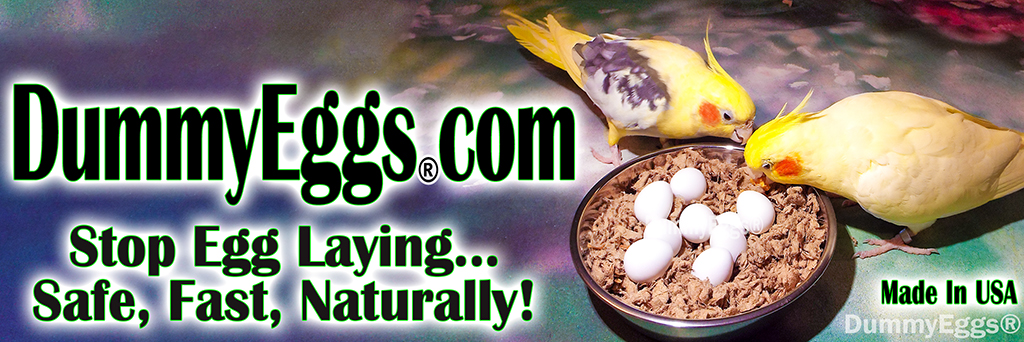

IMPORTANT INSTRUCTIONS!
PLEASE READ DIRECTIONS
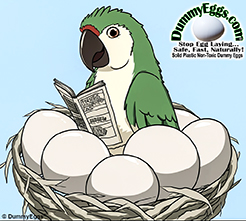
Dummy eggs are solid non-toxic bird egg reproductions used to control breeding in pet birds. Our eggs are exclusively designed and manufactured in the USA since 2006 by DummyEggs®.
Hens start laying one egg every other day. Her hormones tell her how many to lay for her species. Extra eggs will be pushed out to leave the correct number in her clutch or nest. DummyEggs uses this amazing natural behavior to control egg laying in birds.
Substituting one dummy egg as she lays, will NOT signal that it is time to stop laying. Only seeing a full clutch turns off her egg laying hormones and turns on her incubating behavior.
At DummyEggs® our point of view is to give her a nest simulation so she can behave normally. There are no health concerns with a healthy hen who is laying normal natural eggs for reproduction. Dummy eggs cannot stop your bird from ever laying another egg which would not be healthy. Don’t deprive your bird of basic comforts that are often advised, as added stress is not what she needs. Give her the eggs to sit on as nature intended.

Broody or brooding behavior can start before any eggs are laid. Personality changes include fluffed feathers, backing up and rubbing on whatever is convenient, rocking back and forth, nipping and hissing. Your once affectionate friend may recoil from being touched at this time. Natural hormonal breeding instincts kick in and can be present in both partners. This is temporary although it may last the 2 - 4 weeks of her breeding cycle. Don't show stress, be patient and give her DummyEggs!
If possible place and remove any eggs, real or plastic, when she can’t see you. If she acts a little frantic, be patient! Try fresh millet to distract her. Place ALL your dummy eggs in a shallow flat bowl large enough for her to sit in comfortably. Remove all her live eggs if any. Then put this nest bowl at bottom of cage or where ever your bird is comfortable. Fill with shredded white paper towels or “Natural Paper Bedding” with no odor absorption. Newspaper inks stain the plastic. Don’t use a commercial nest box either, as these encourage nesting behavior.
Ideally your bird will lose interest within 2-4 weeks and you will remove the dummy eggs the same way. Leaving them in longer may render them ineffective for her next clutch. Remove them after the number of days listed in our incubation chart above. If she is still shaken after 2 hours, replace the nest bowl and try again tomorrow, perhaps at a different time of day. Clean the plastic egggs, bowl and paper often.
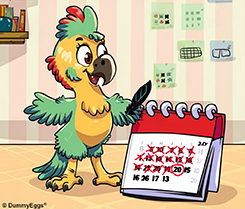
The time between reproductive cycles varies by species. Brooding behavior will signal when it is time to reuse your dummy eggs. Put your fake eggs back in her nest before she starts laying, when you see brooding behavior, as soon as she lays her first egg or replaces an entire clutch.
Egg laying can depend on many internal and external factors. Sometimes juveniles start before they are ready to be good parents. Many large parrots such as large Macaws, Cockatoos and Hyacinths do not lay their first eggs until they are mature and in their 20’s.
Dummy eggs are safe, non-toxic, unbreakable, and reusable. Our dummy eggs are solid polyurethane, an inert plastic that does not break down or dissolve. Eggs can be cleaned with detergent and bleach or placed in the dishwasher.
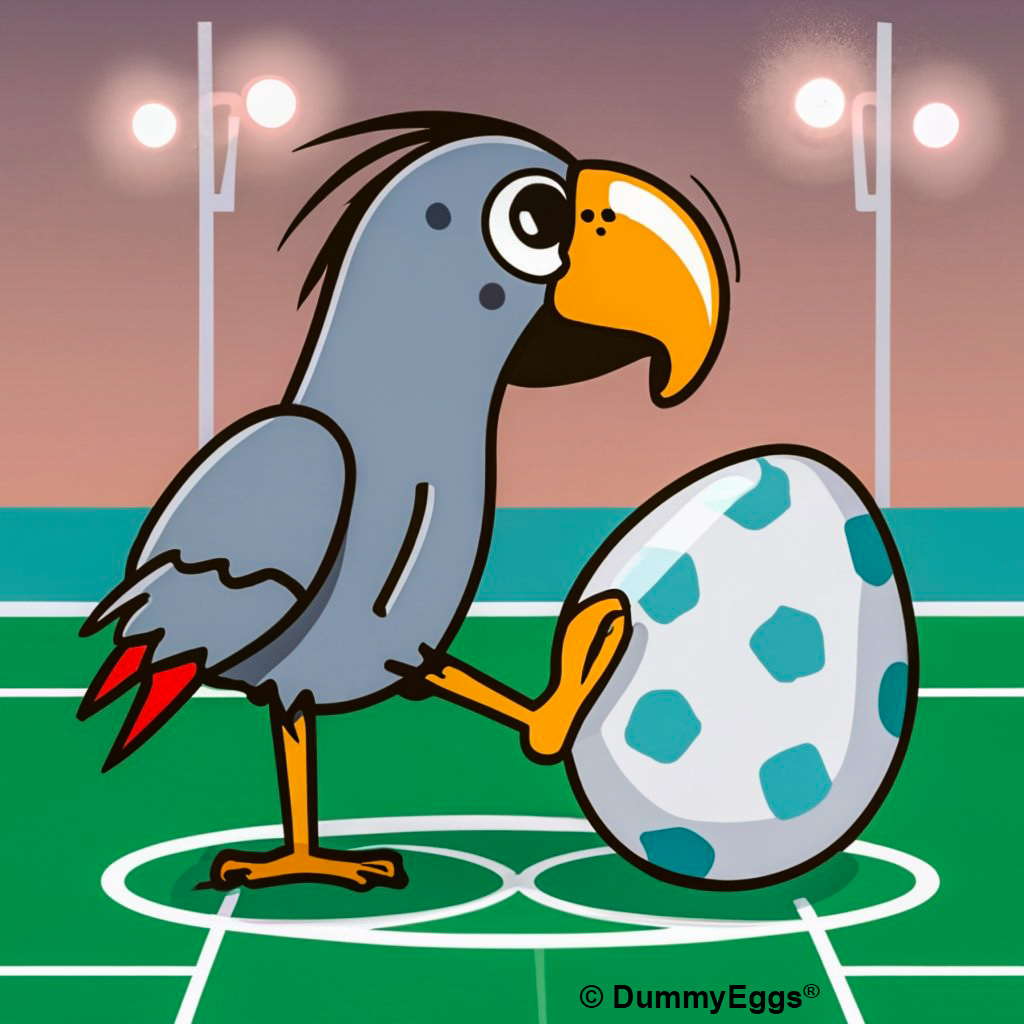
Most birds will not reject a plastic egg with a slight difference in size, color, shape, or texture. If it looks close to their egg, they will accept it. Birds may reject DummyEggs due to a foreign scent, or they can be laid from a perch smashing to the floor. Birds break eggs by pecking or kicking them. And many, especially juveniles, don't have maternal instincts yet, with no interest in incubating them. These same birds can easily become chronic egg layers and DummyEggs can help avoid this.
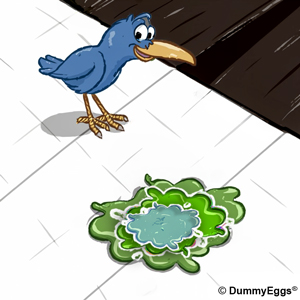
After sitting on her eggs for many hours, the female will leave her nest to eat, drink and eliminate. A bonded male and female may take turns sitting on the eggs. Don't be alarmed if your hen’s droppings are much larger than their normal size. This is a sure way to tell when brooding starts and stops.
If you your bird is truly a chronic egg layer, you could take additional measures to disrupt her routine. Move her cage, rearrange the things in it, set up new and shorter hours for being uncovered, change her diet to less treats and more pellets. Birds lay when they feel secure and at home. Let us make her feel like she is on vacation, but not lost in the woods.
Birds will lay eggs with or without a mate. She will lay eggs during each breeding cycle and will incubate them regardless of whether they have been fertilized.
CALCIUM BLOCKS & CUTTLEBONES ARE A MUST! The freshest cuttlebone can be purchased in 5 lb. bulk boxes from Amazon.com and other retailers.
CHRONIC EGG LAYING: It isn’t normal egg laying when it goes on continually for weeks or months. Chronic egg laying can result from removing eggs as birds will replace them. A full clutch of can stop laying and trigger incubation.
Chronic egg laying depletes calcium levels and can cause soft shell eggs. Soft shell eggs are hard to pass, resulting in Egg Binding. An egg-bound bird needs immeditate medical attention.
HORMONAL SUPPRESSANTS: Your avian vet can give hens hormone shots which can be expensive and last only a few months, much like birth control pills. Use dummy egg therapy in conjunction with your veterinarian.
We know it is hard to guess the right size of your bird’s egg, especially if you do not have a real one to measure. Please email us with any problems so we can help you with any questions: info@dummyeggs.com
Refunds will be issued as soon as we receive the return of merchandise. We guarantee complete satisfaction or your money back within 14 days of purchase. The fastest method for an exchange of size is to order another set larger or smaller eggs. Be advised that a small difference in size isn’t that critical, while exchanging eggs will be a significant change in size. E-mail me with your new order and I will send a return envelope.
©DummyEggs.com®
|
SPECIES |
DUMMY EGG SIZELength x Width |
AVG. CLUTCHHow many eggs in nest |
AVG. INCU-BATIONHow long to leave in nest |
|
|---|---|---|---|---|
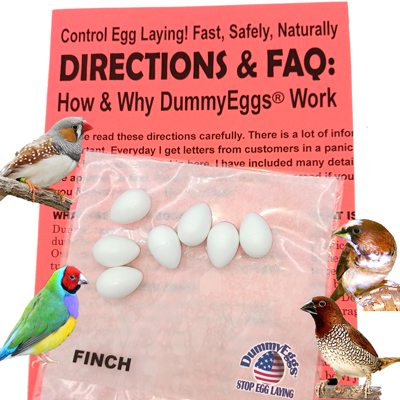 |
Finch |
5 |
12 |
|
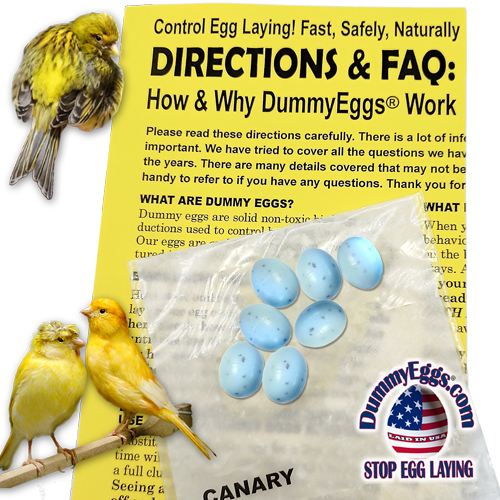 |
Canary |
5 |
14 |
|
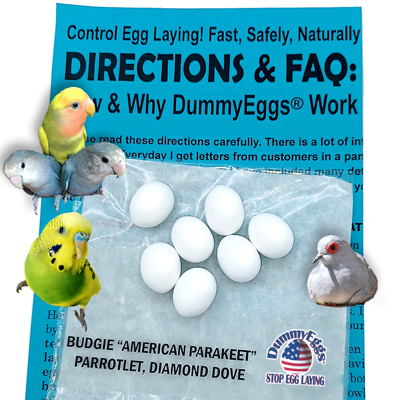 |
Parrotlet
|
5 |
23 |
|
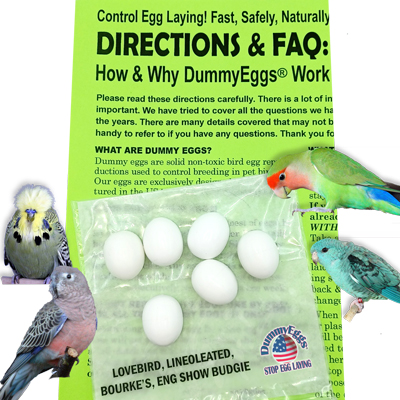 |
Lovebird,
|
5 |
23 |
|
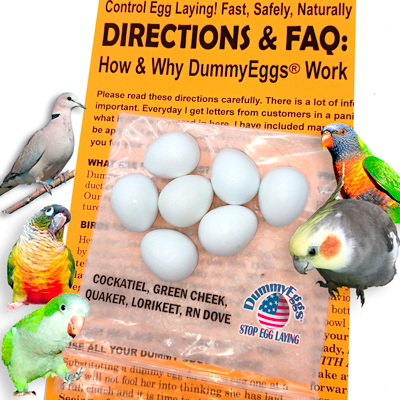 |
Cockatiel, Quaker,
|
6 |
19 |
|
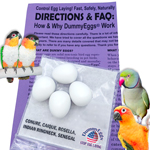 |
Conure, Caique, Indian Ringneck, Monk Parakeet, Pionus, Senegal,
|
4 |
24 |
|
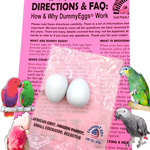 |
African Grey,
|
4 |
29 |
|
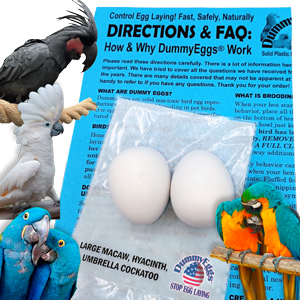 |
Macaw, Hyacinth
|
2 |
28 |
|
|
© DummyEggs.com |
||||
If you're a bird owner dealing with unwanted egg laying you have three options:
DummyEggs® can also be used in the same manner when your bird first starts to display hormonal brooding behaviors that you will be sure to notice. These can include not wanting to be touched, wanting to be touched too much, and unusual aggression. Both males and females will show these signs, and using our plastic eggs can both calm and satisfy their need to reproduce.
So, which option is best for you and your bird? The choice is yours. We highly recommend the use of DummyEggs® to limit the number of eggs your bird lays, minimize stress for you and your bird, and prevent potential health complications. The proper way to use DummyEggs® is to put in the same number of eggs as she would lay in a full clutch. This "fake clutch" tricks her to stop laying and start sitting her nest.
Common advise is often to make your bird feel less secure, less comfortable because hens won't lay if they feel threatened or food insecure. This is achieved in various ways as described in the Vet's Advice article below.
DummyEggs’ philosophy has always been to give them what they really want, A FULL CLUTCH OF EGGS. This is when nature signals to stop laying more eggs. Birds count their eggs! A bowl of dummy eggs simulate a full clutch of eggs that your hen can sit on until she looses interest. She feels fulfilled and you are in control. So simple! So healthy! If you follow our directions, they can work like magic!
Plus, they're easy to clean and sanitize, so you can reuse them again during the next breeding session. If you're timing of using your new plastic dummy eggs wasn't quite perfect the first time, there is always the next! Soon, you will recognize the signs and get in rhythm with when to place the dummies in her cage.
If your bird has already laid a real egg, it may be helpful to measure its length and compare it to the selection of eight sizes we offer from Finch to Macaw. Please note that while it's ideal to select the best-fitting size, it doesn't have to be an exact match. Our selection of different sizes allows for some flexibility, and choosing a size that's close to the real egg's size should work well for most birds.
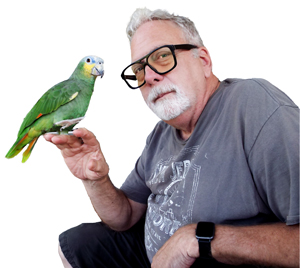
by Kirk Williams & Paulie the Amazon Parrot
There are several factors that can impact the cost of manufacturing and selling plastic bird eggs made in America. Firstly, the cost of labor is typically much higher. This means that the cost of manufacturing a product, including the cost of raw materials and the cost of paying workers to produce the item, is generally higher in America. Additionally, there may be differences in the quality of materials used in the production of plastic bird eggs versus those made abroad. American-made plastic bird eggs may be made with higher-quality materials or may be subject to more rigorous quality control standards, which can increase the cost of production.
Furthermore, there may be differences in the regulations and standards that manufacturers in America are required to comply with. American manufacturers may have to meet more stringent environmental, safety, and labor regulations than manufacturers elsewhere. Finally, there may be differences in shipping and distribution costs between products made in America. Shipping costs from other countries can be relatively low, while shipping costs from America may be higher due to the distance and infrastructure required to transport the goods.
When you choose American-made, you support local businesses, American workers, and our country's economy. From cars to clothes, furniture to food, buying American-made means you're investing in America's economy, your economy.
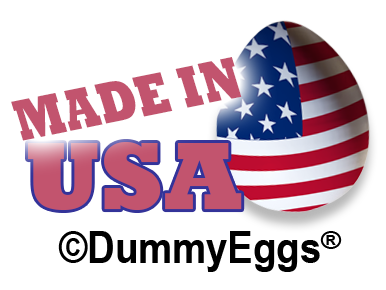


Copyright© DummyEggs®
2024 All rights reserved.
Lakeland Florida USA
All images and copy are protected by copyright. DummyEggs® is a registered trademark
DummyEggs® manufactures and sells plastic bird eggs to aid in reducing complications from the natural and ongoing reproductive cycle of female birds.
We are not medical professionals or veterinarians. Please consult with your avian veterinarian for all health concerns as soon as possible.
Please visit my other website for dog lovers.
k9galleryofart.com